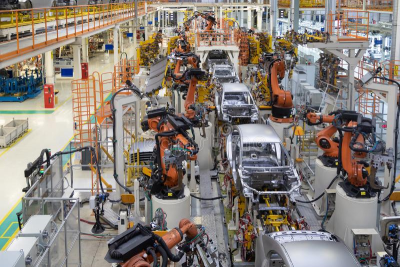The question comes up: What are the economics of being an Auto Worker? From what we hear, there will be a few thousand of these near us soon enough.
For the purposes of this, we want you to put yourself in the place of one of these hard working people, in one of these big new highly automated assembly plants. This is not the kind of article we usually print in this blog, but that is okay.
How do we know this stuff? Let’s just say that we have connections.
It is useful for a few of the readers of this blog to understand who an auto worker is, and what his or her life is like. Think of it as cultural broadening. If, at some point in the near future, you need to know what an auto worker in rural Georgia lives like, so much the better.
We’re telling you this because among other things, we like surrounding ourselves with art, literature, things of beauty, and nice flavors and fragrances. We call all of this “Human Scale Living”. Working in a giant auto factory is just the opposite. You’re surrounded by chaos.
11:30 AM You hit the floor with a “Thud”
You’re sleeping on your brother’s couch. You’re paying him $700 a month which is half of his rent in an average, reasonably safe apartment in Conyers. You fall onto the floor with a headache.
You’re doing this because you’re new on the job. You’re not now and unlikely ever to be able to afford a little cookie cutter house in Madison, once they build them, as we will see later. A mill house in Monroe might be more likely.
There is plenty of time to make it to work, since you’re working the second shift, which runs from 3 to 11. Still, you’ve come in late twice in the last month, and they’re threatening to fire you. There are distractions in your life.
You dig around in a pile of clothes on the floor to find your blue T-Shirt.
A Day in Your Life as an Auto Worker: Life of a Temp
At a given time, in one of these places, anywhere between 10 and 30 percent of the workers are “temps” that is, “temporary employees”. You don’t actually work for the company, you work for a temp agency. Ironically, for the service of finding, background checking, drug screening, and giving you minimal training, the “company” gives them a fraction of your pay. There’s no rule as to how long they’re allowed to keep you as a “temp” either.
Does that make you mad yet?
Here’s the other thing. It is very common for you to show up for your job and work shoulder-to-shoulder with someone who works for the “company” and takes home the same amount of money. The “temp agency” is benefiting from your labor.
Let us know at which point along here you are mad.
The blue shirt, by the way, designates you as a “temp”. There are rules to the effect that a supervisor for the “company” is not supposed to boss you around. You have a “temp boss” to tell you what to do, and he also doesn’t get as much money or love as a “company boss.”
They issue you two of these on the first day, and nobody expects them to last more than a couple of months. Faded blue T-shirts are rare enough on the plant floor. No one stays around long enough for their shirts to get old.

You need a car
Time to go out and get into your car. You need a car to get to work, because there is no subsidized public transportation to the plant.
I guess you are proud of your car. It was bought with zero down from one of those little used car lots on Highway 81 that you drive by all the time.
Let’s say that you decided to get a “nice car” which is a used red car of some type with only 100,000 miles on it. You paid $7500 for it, which is a bargain, and they did you a favor by letting you finance it. Since you are a young person, you don’t have $7500 saved up, so “they”, namely the used car guy, gives you a break and finances the car.
“They” give you a 36 month loan, for 6.88% interest. Wasn’t that nice of them? And you get to drive a red car.
Are you mad at this? No, not really, because you’re unaware that “they” are taking advantage of you a bit. Your car payment is $227 a month. It’s all part of A Day in Your Life as an Auto Worker
You cruise in to the QT.
Breakfast not at Tiffany’s
You’re driving 27 miles one way to work, and ironically, let’s say that your car gets 27 MPG. You could have gotten a more practical model, but it wouldn’t have been red.
So you’re using 2 gallons a day, at the current price of $3.50 a gallon, that means it’s costing you $35 a week or $140 a month for transportation. But, because you are who you are, you’re paying another $100 a month for insurance, and depreciation is nowhere in here because in three years, when it is paid off, your car is going to have 150,000 miles on it. You’re putting 14,000 miles a year on it, even if you park it on the weekends. It will start to break down. You will be late to work.
Are you mad yet? No, because you can’t predict the future. You don’t know what is happening to you yet. It’s all part of A Day in Your Life as an Auto Worker
Here’s your breakfast:

You don’t eat this every day. Some days you have Hunt Brothers Pizza. Your lunch comes from the cafeteria at work and that is subsidized at least. A reasonable amount of food can be had for about $6. Let’s be generous and say that you drive through someplace on the way home, for another $7.00.
So it costs you roughly $20 a day to eat. That’s another $600 a month.
You get to the Plant
You have to wait behind the line of trucks. An endless stream of trucks is coming in and out of this place 24-7 and if you don’t add an additional 10 minutes to your commute time, you end up being late.
You get to the parking lot. The salaried people get to park in the front, then the “employees”. The “Temp” parking lot is in the back. You have to sprint to the door.
These big assembly plants are laid out in lines. There’s a body line and a chassis line. You don’t work on the line. You work as a material handler. Somewhere in the neighborhood of 50 percent of the headcount does nothing other than unpack boxes, put them onto a rack just right, and haul them to the line. There, either an employee or a robot grabs the component and installs it onto either the body or chassis. Toward the end, the two lines merge.
You are a material handler, just like 1000 other temps. Some days you pick components from the warehouse, sometimes you unbox them and load up the carts, and sometimes you just move things around.
It’s easy work, but noisy, and dangerous. There are forklifts, and big cranes, and nothing is simple. Most of the heavy lifting has been done away with. You’ve been there for a couple of months, and have yet to see a car. The place is so big that all you see is the line. It’s like Vegas too. There are no clocks. You can’t tell what time it is.

In fact, the biggest enemy is boredom. It causes more quality and safety issues than anything else. Comically about every five minutes, they play the first 10 seconds of some famous song (Sweet Home Alabama?) (Don’t Stop Believing?) Just when it wakes you up, and you want to dance along, they shut it off.
Night shift is terrible.
About you
Well, your typical new employee in a place like this is male, about 22, a bit too old for fast food but not really your world class workforce. About 20 percent of the workforce is female.
You are a product of the local school system, and you got your diploma. You didn’t do well in math though.
Maybe you are an immigrant, actually, and in this place there could be a dozen languages being spoken.
For the moment we’ll leave out the can of worms about the racial stuff, because it doesn’t really matter.
You’re all in about the same boat.
The Pyramid
We should talk about this.
There’s one plant manager at the top of the Pyramid. You want to know something not really funny? The average plant manager in the US automotive industry makes less than the franchisee at Chick Fil A.
Under him there may be a half dozen “process owners” that are the main authority figures. Engineering, Production, HR, Logistics, and Quality Assurance. There may be a layer under the production person for each line.
Below each of them there are a number of superintendents, high level technical experts, and senior people that gather data and make decisions. There may be some maintenance people who have specialized training.
From here on up in the pyramid it might be 15% of the workforce. These are the people that get paid enough to be a bit more comfortable.
Below them, there are the “lead operators.” A few years ago, a lot of these companies figured out that having “line bosses” was unproductive and caused problems. So you have a “lead person” that is in charge of your scheduling, communication, motivation, and they look over your shoulder to get you to do things right. The “lead operators” don’t make that much more money than you do. They’re technicians like you who have a little extra aptitude.
The Rest of You
Below them are you and the rest of the “associates.” At any given time the workforce may fluctuate between 10 and 30 percent “temps”. Some people may be called in for a specific job. For example, there might be “sorting” where they bring in a crew for a few nights to go through a big box of nuts and bolts that got mixed up somehow.
The cost to train a new employee is estimated at up to 1-3 percent of the first year’s wage. You’re actually trained less than Chick Fil A employees, who get 2 weeks (4%) before their first “my pleasure.”
The automotive people see no problem running an operation where the wages are low. The cost of this turnover is less than the cost of the retaining employees by paying them more.
So that’s the way it works. It’s a lot like the rest of the system where the few people at the top are doing reasonably well, but everybody else is basically in the same boat.
What could possibly go wrong?
Getting back to you, the worker.

Since you are not good at math, let’s lay this on you:
We’ve been adding all of this up. With your 40-hour a week job, you have “disposable” income, after all of your expenses, about $23 a week. That’s if you’re a boy scout, and never go out for a beverage, and don’t have any bad habits. And, if the price of gas doesn’t go up too much more.
Of course, you could look for ways to cut down your expenses we suppose. That’s where you and 10 other people rent out a big house someplace and violate the R1 zoning until the neighbors complain.
You haven’t had a disaster yet. Your car hasn’t broken down, or needed tires, costing you money. Forget shopping for clothes. At least you have a blue shirt. So far, you haven’t had any other bad luck. You also haven’t approached the young female in the next line over for some friendly fun. No telling where that could end up. She may already have a young one or two being watched by her mom.
| Gross Pay | $2400 |
| Taxes | $360 |
| Net pay | $2040 |
| Auto Insurance | $100 |
| Rent | $700 |
| Car | $250 |
| Gas | $200 |
| Phone | $100 |
| Food | $600 |
| Expenses | $1950 |
| Net Disposable Income | $90 |
| Disposable Income per Week | $23 |
Side Note:
This article was originally written in March of 2022, when the price of gas was $2.50 per gallon, and there was no presumed food inflation. Guess what has happened in the 6 months since then? That $23 has gone to negative.
We’ll re-do the calculation as soon as things settle down a little, if ever.
There are a couple of other things.
No one told you when you took this job you literally would have nothing to show for it at the end of the month. That’s if things go well. What they don’t tell you if you are a temp, they can literally call you in the morning and tell you not to come in because the truck was late. Or, because there are too many of these cars in the world and they need to cut production.
So you lose one day’s pay a month and you’re breaking out the plastic.
We haven’t talked about medical yet. If you’re a temp, there is often some bad medical insurance that they will give you. But you’d better not get sick.
Are you mad yet? No, maybe you’re just stressed out, and a bit burned out with nothing to show for it.
The Last Straw
You’re driving through Rutledge in your red car, and roll through the stop sign. The Morgan cops give you a $300 ticket. Where is that money going to come from?
Now you’re mad.
What they’re not telling you.
At the prevailing starting wage of $15 an hour you may love your job, but it’s basically a waste of time. In a way, you’re actually better off to crawl back into bed, and look for something closer and better.
If you suck it up, and stay for a couple of months, and get your extra $0.50 per hour, you’re looking at another $120 per month disposable income. Still no margin for error.
You’re not going to eat a $9 sandwich at the Sinclair. You’re not going to buy a $150 pair of shoes at the Barking Dog. You won’t buy a house in the new subdivision in Madison. You might be able to move into your own place at some point, but you are very likely to end up worse off in a world of 9% inflation.
It is possible through some combination of hard work, cost cutting, understanding of math, and getting a side job, you might be able to hang in there long enough to become a “regular” employee at which time they treat you a little better.
There are side hustle opportunities sometimes. You could sell some of your fellow employees something that they would like, to help them through the night. Things like this have been known to happen.
Some of these places will train you to be a mechanic, or a robot programmer or quality guy, or process engineer. But, you need to be good at math, remember? You could attempt college. That could be done in the hours between 8 and 11:30 but you didn’t pay attention in high school.
According to the bureau of labor statistics, if you’re a low wage worker, there’s a 90 percent chance that you will still be stuck there 10 years later.
So that’s your future. Sign you up, right?
Who wins?
So in the grand scheme of things, in the big picture, who wins?
You know it’s not you.
Your cousin, or brother, is putting up with subsidizing your rent. He is not winning.
The used car guy? Not really. He has a lot of customers trash their cars, and walk away from his loans and he ends up holding the bag.
The Quick Trip or Dollar General? The person behind the counter gets paid less than you. It’s possible that the stockholders of those companies are benefiting.
The car company? That’s very questionable.
Does anyone else in the community benefit? It remains to be seen. We will listen to arguments either way.
Anyway enjoy your night shift. We will listen to counter-arguments if there are any. Bring your Links and References. We’re trying to deal with the facts here, to the extent that we can.
Links and References
Current Apartment Rent in Conyers
https://www.rentcafe.com/average-rent-market-trends/us/ga/conyers/
Current used car interest
https://www.bankrate.com/loans/auto-loans/rates/
Low wage workers trapped in low wage jobs
Average automotive production salary
https://www.zippia.com/automotive-production-worker-jobs/salary/
Plant Manager Salary
Cost to train an employee
Chick Fil A Management Salary
Chick Fil A train for two weeks
https://www.glassdoor.com/Benefits/Chick-fil-A-Job-Training-US-BNFT43_E5873_N1.htm
Rockdale SAT Math Score
![]()
